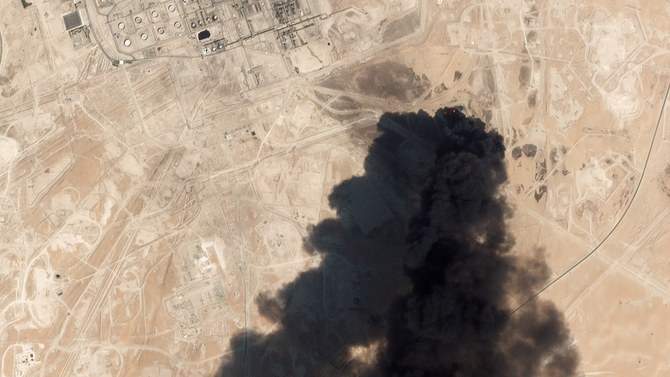DUBAI: Saudi Arabia’s ambassador to London said on Wednesday that Iran was almost certainly behind attacks on Saudi oil facilities.
“Almost certainly it’s Iranian-backed,” Prince Khalid bin Bandar bin Sultan Al Saud told the BBC.
“We’re trying not to react too quickly because the last thing we need is more conflict in the region.”
“We’re investigating the issue. We’re working with our partners in the United States, the UN, the UK, and anyone else who wants to get involved, to help us resolve what happened, figure out what happened, where they came from, the attack.”
However Saudi Arabia has promised it will present evidence on Wednesday evening that it says will link Iran to the attacks.
The press conference will show evidence of Iran’s involvement in the Aramco attacks, state TV added.
It will also show Iranian weapons that were used in the attacks.
Iran denies any involvement in the attacks, but has threatened retaliatory action against any country that attacks it.
Late Wednesday the UAE Minister of State for Foreign Affairs Anwar Gargash took to Twitter, praising Aramco for its handling of the crisis, saying the firm deserved medals for its professional and political reaction.
أرامكو تستحق شهادة إمتياز على المستوى المهني وأخرى على المستوى السياسي، الإقتصاد العالمي يدين لأرامكو بالشكر ورسائل الخير والإيجابية مصدرها السعودية.
— د. أنور قرقاش (@AnwarGargash) September 18, 2019
Late Wednesday US President Donald Trump said he had ordered Treasury Secretary Steven Mnuchin to “substantially increase sanctions” imposed on Iran.
He did not give additional details on the move.
Prince Khalid bin Salman, Saudi deputy defense minister, tweeted about the US sanction increases saying Saudi Arabia thanked the US for its stance against Iran and appreciated its position.
President Trump’s Administration has confronted the Iranian regime's and terrorist organizations aggression in an unprecedented way - we in KSA thank the President for his stance, we will continue to stand with the USA against the forces of evil and senseless aggression.
— Khalid bin Salman خالد بن سلمان (@kbsalsaud) September 18, 2019
Russian President Vladimir Putin discussed the attacks by phone with Saudi Crown Prince Mohammed bin Salman also on Wednesday, the Kremlin said.
Putin and the crown prince expressed their commitment to bilateral cooperation on stabilizing global oil prices and the Russian leader called for a thorough and impartial investigation into the attacks in Saudi Arabia, the Kremlin said.
Putin is expected later this year to travel to Saudi Arabia.
The head of Russia's Direct Investment Fund on Wednesday praised Saudi Aramco's quick recovery of oil production after attacks on its facilities, and said Russian companies had offered to help fix the damage.
The Saudi Aramco facilities were hit in drone strikes on Saturday, causing fires to break out.
The Houthis claimed responsibility, but an investigation is underway involving representatives from various nations.
Meanwhile US broadcaster NBC reported that President Trump had received a security briefing on possible actions against Iran – including military.
However it is understood that Trump sent the advisors away asking for further options.
The United States believes the attacks that crippled Saudi Arabian oil facilities last weekend originated in southwestern Iran, a US official told Reuters, an assessment that further increases tension in the Middle East.
But Iran issued a denial on Wednesday with a stern warning to the world that it would respond to any attacks.
In a diplomatic note sent to the United States, Iran denied any role in the attacks on Saudi oil installations and warned of a response to any action, state media said Wednesday.
The formal memo sent on Monday through the Swiss embassy, which represents US interests in Tehran, “emphasized that Iran has not played any role in this attack and denies and condemns” the US claims to the contrary, the official IRNA news agency said.
Iran’s security minister warned that any attempt to attack them would be met with an “overwhelming response.”
Meanwhile the US Secretary of State Mike Pompeo will meet with Saudi Arabia’s Crown Prince Mohammed bin Salman in Jeddah on Wednesday to discuss the attacks and coordinate efforts against “Iranian aggression.”
Mike Pompeo “will meet with Saudi Crown Prince Mohammed bin Salman to discuss the recent attack on the Kingdom’s oil facilities and coordinate efforts to counter Iranian aggression in the region,” a Twitter posting said.
Pompeo will then travel to the UAE capital Abu Dhabi to meet with its crown prince, Sheikh Mohammed bin Zayed, and discuss regional and bilateral issues, it said.
(With AFP and Reuters)














